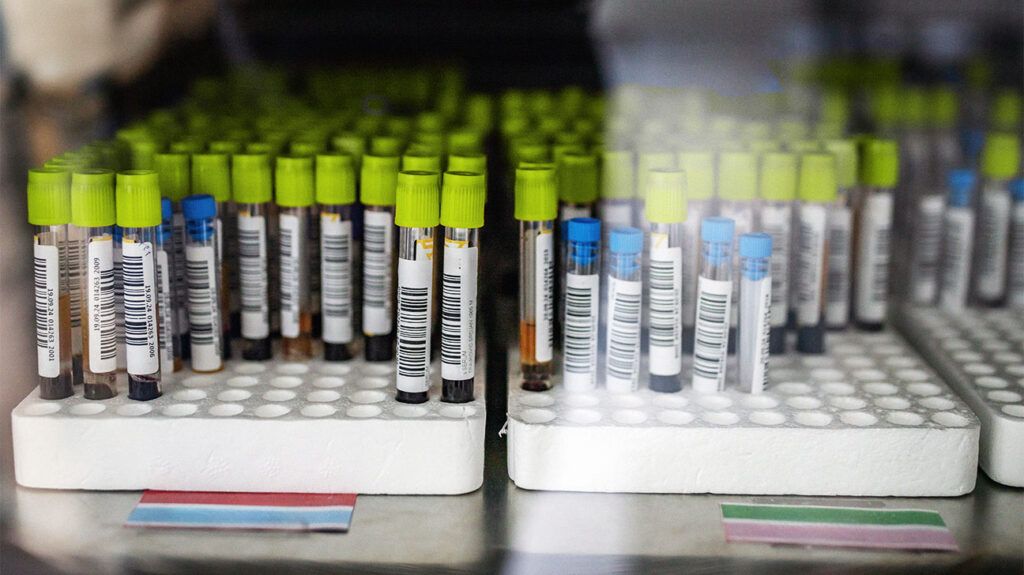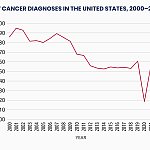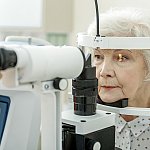
Previous research shows that people with inflammatory bowel disease (IBD) — including ulcerative colitis and Crohn’s disease — are at an increased risk of developing colorectal cancer compared to people who do not have IBD.
People with IBD are at a higher risk of developing colorectal cancer, also known as bowel cancer, due to the chronic inflammation associated with IBD, which can cause the growth of abnormal cells — known as dysplasia — and cause the development of precancerous polyps in the intestinal tract.
Currently, people with IBD are screened for colorectal cancer every
Now, researchers from The Institute of Cancer Research in London have developed a new test that they report can predict bowel cancer risk in people with IBD with more than 90% accuracy.
Details on the new test were recently published in the journal Gut.
According to Trevor Graham, PhD, professor of genomics and evolution and director of the Centre for Evolution and Cancer at The Institute of Cancer Research in London and senior author of the study, although people with IBD have an increased risk of developing bowel cancer, there is no good way to predict that risk at the moment.
“For people who are thought to be imminently at risk of developing cancer, the only effective treatment is surgery to remove some or all of the
“On the other hand, for people whose risk of bowel cancer we think is low and for whom we don’t operate, these people continue to have anxiety about the uncertainty of their cancer risk,” he added.
During the study, researchers found that people with IBD who had pre-cancerous cells that lost or gained multiple copies of DNA had an increased risk of developing bowel cancer.
From there, the scientists created an algorithm to calculate future colorectal cancer risk by using the exact pattern of the changed DNA in the pre-cancerous cells.
“In the UK, people with IBD have regular colonoscopies — a camera pushed up their bottom — to look for early signs of cancer,” Graham explained. “If something unusual is spotted, a biopsy — small tissue sample — is collected.”
“Our test is a genetic test that we perform on the biopsy. We compared the genetic signals from people who did go on to develop cancer to those who did not, and we have created a test to predict someone’s risk based on the genetic signals in their biopsy,” he said.
During the study, Graham and his team found that their new test was able to predict which study participants with IBD who developed pre-cancerous cells would go on to develop colorectal cancer within five years with more than 90% accuracy.
“We hope that the accuracy with which we can predict who really is at risk of cancer will mean that we can give treatment appropriately,” Graham said.
“For those at high risk of developing cancer, they can have surgery to remove their bowel and their risk of cancer. For those at low risk, we can spare them unnecessary worry and unnecessary treatment. For patients to be able to benefit from this, we need to show that our predictions hold true in clinical trials that we hope to run in the future,” he explained.
“People with inflammatory bowel disease are at increased risk of developing bowel cancer, but most IBD patients will not develop cancer. Our new test predicts who really is at risk, so that all patients can be treated in the way that is best for them. Our next steps are to run clinical trials to prove our predictions hold true in real world settings. Then we hope to be able to offer the test in the NHS in the coming years.”
— Trevor Graham, PhD
MNT also spoke with Rudolph Bedford, MD, a board certified gastroenterologist at Providence Saint John’s Health Center in Santa Monica, CA, about this study, who praised the study as “wonderful, great, and amazing.”
“The fact of the matter is that our patients who have IBD, we’re doing frequent colonoscopies, biopsies looking for dysplasia or cells or tissue that can lead to cancer. Then we have to have these discussions with them. If they do have these low-grade dysplastic cells, do we take out your colon, or do we do more frequent surveillance? What do we do?” Bedford explained.
“If somebody is going to give me a test that has a 90% accuracy as to those patients with inflammatory bowel disease that might develop cancer, then that’s a wonderful study,” he continued. “It makes my job a lot easier in terms of targeting my therapy, and patients won’t have to undergo these invasive procedures as frequently as we do them now, so I think it’s a great study.”
“If they can make it into a blood test or stool test, that would be wonderful. You want to make it as easy as possible for your patients.”
— Rudolph Bedford, MD
MNT also spoke with Nilesh Vora, MD, a board-certified hematologist, medical oncologist, and medical director of the MemorialCare Todd Cancer Institute at Long Beach Medical Center in Long Beach, CA, about this study.
“I think this study is a really great look at more accurately predicting who may be at higher risk for colon cancer when they have inflammatory bowel disease,” Vora said.
“This is a really great study for the gastroenterologist who follows patients with inflammatory bowel disease to know that there might be a way to identify who’s at higher risk and who’s not.”
— Nilesh Vora, MD
“I think the next step is to see if this can be approved by the FDA as one of the ways that we can identify patients at higher risk. I think it’s a great test that can be used to help determine who needs colonoscopies every year, and who could go every three years, every four years if they have inflammatory bowel disease,” he added.





